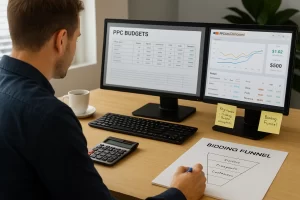Websites exist to be visited, yet different sites have varied definitions of visits.
For example, traffic can be a source of revenue from adverts for media sites. For eCommerce businesses, traffic equals direct sales.
Some sites may not be selling anything, or they may be selling a brand, in which case simply getting people to look at your material counts as a gain.
Whatever your website is about, traffic = customers.
In search engine jargon, ranking = traffic, which = consumers.
So it’s an issue if your search ranking drops – or your traffic drops – that’s a problem.
Whether you’re a digital marketing strategist, Search Engine Optimization (SEO) expert, webmaster, or another stakeholder, it may be your obligation to research the issue and find out how to get things back on track.

If your traffic has plummeted and you need a solution, here are a few places to investigate.
- You’re Tracking the Wrong Rankings
If your site has been online for a long time, your keywords may no longer be relevant. Consider your personal search behavior and how it compares to the keywords that appear in your Search Console statistics.
Do you employ industry or specialist terms that your target clients may not be familiar with?
Many people will look for several permutations of the same query and yet be unable to find an answer or solution to their difficulty.
Google engineers have greatly enhanced their natural language comprehension abilities. People can now search for information using more natural language. It is also easier to rank for those terms if your content is written in simple language.
In recent years, search engines have also caught up on this issue. They are rating websites based on whole sentences and other features of more natural language, rather than just a few keywords.
Examine your keywords and keyphrases. If you’re tracking the wrong ranks because you’re utilizing old or generic keywords, you need to alter your strategy.
- Lost Links
Another reason your search ranking and traffic may have fallen is that you have lost links.
If you’ve lost a lot of links, this could be the cause of your ranking reduction.
There are a few more questions you should ask about the disappearance of this link:
- Is the link drop sitewide?
- Are the lost links located on the same pages of your site where you have seen a drop in rankings?
- Has there been a drop in inbound links to your pages that have lost their ranking?
- Do you notice dropped links to pages on your website that connect to lower-ranking websites?
If your inbound links are broken or missing, you’ll need to figure out where they’re coming from and why they’re broken.
- Broken Redirects
If you’re launching a new website, relocating to a new server, or making any structural changes to your site, your rankings are likely to suffer unless you have a comprehensive 301 redirect plan in place.
Every SEO marketing strategy expert’s greatest nightmare is a broken redirect.
When employing a 301 redirect, be sure to update your XML sitemaps, canonical tags, and links.
A 301 redirect is similar to a web-based change of address notice. This notification informs search engines that one or more pages, or your entire website, has been relocated. You’re requesting that visitors to your website be directed to your new address rather than your old one.
- Algorithm Changes
Google is always tweaking its algorithms in order to better its methods and outcomes. Many websites have been harmed as a result of these adjustments, and their rankings have plummeted as a result.
Use a successful cross-channel digital marketing and traffic strategy that combines social media and other marketing channels to avoid getting crippled by Google changes.

- Natural Changes in Search
There may be times when you see a decline in your search engine rankings that is unrelated to your website. Google frequently modifies the type of results it displays based on user behavior.
If your material falls into the second category, your rating will suffer.
You might use Google Trends to determine if any changes have occurred that could explain the disparities.
- Competitor Improvements
It’s possible that despite doing everything correctly, you’re losing visitors and seeing a drop in your rankings. One cause for this could be because your competitors are outperforming you.
Analyze and monitor your competitors’ social media activity, link-building techniques, and content marketing to keep an eye on them. To discover what modifications your competitors have made, you can use tools.
You may also utilize backlink tools to determine whether they’ve received any new backlinks; they might be conducting their own Search Engine Optimization (SEO) marketing strategy campaign.
Make some of the same changes your competitors did to outrank you once you’ve figured out what they did.
- Page Speed
The speed with which the material on your pages loads has an impact not just on your rankings but also on the user experience of your website visitors. Bounce rates are higher when pages take longer to load because consumers don’t want to wait to read your content.
Pages are classified as fast, slow, or average based on how rapidly they load.
- Internal Navigation
Your website navigation tells your visitors what information they can find on your site and where they can find it.
For interior navigation, aim for a flat, narrow structure with two or three floors at most. Visitors are more likely to depart if they have to click too many times to find what they’re looking for.
Search engines may stop crawling content that is hidden deep within your website. As a result, your rankings will drop, and traffic to crucial content areas will decrease.
Internal link techniques are essential to your other client retention techniques as well as strong search optimization.
You may improve customer retention and raise other rank indicators like time-on-site by applying advanced SEO techniques and making your internal links and navigation straightforward and logical. Using keyword-rich internal links will also assist search engines in swiftly determining what your site is about and whether or not your material is related to queries.
- Bad Quality Link Penalties
All links are not created equal.
Google will punish your site if you adopt hazardous, spammy, or out-of-date link-building techniques. Google defines a low-quality link quite plainly in the first paragraph of their search console assistance section called Link Schemes:
Take the effort to create a high-quality link-building strategy to avoid Google penalties and increase your organic search traffic.
Here are some ideas for creating quality links:
- Repair your broken links by creating new, valuable ones.
- Make use of public relations to become acknowledged in web content or a news article.
- Create excellent content and extensively market it on social media so that people can find it.
- Recent Website Changes & Redesign
If you decide to rebuild your website, you don’t want to lose the traffic and rankings you’ve worked so hard to achieve.
The following are some particular strategies you may take to not only aid but also improve your rankings:
- Ensure that all 301 redirects are properly mapped.
- Examine the link structure of your inbound links to ensure that they are working properly on your new site.
- Get some baseline metrics information, such as a rank tracker, site audit, traffic, and page URL mapping, before launching your new website.
You may avoid negatively hurting your SEO and rankings and possibly increase them with careful planning and attention to the crucial components of your redesign project.
- Simple Technical Issues
The health of your website’s technical base is measured by technical SEO. It’s SEO effort that has an impact on how search engines crawl and index your content.
See Most Common Technical SEO Mistakes: How serious Are They? addressing some of the most prevalent problems that could harm your website’s traffic and rankings Being aware of technical SEO difficulties allows you to take better care of your website and maintain its rankings.
Some of the fundamental difficulties that can prevent you from ranking are technical SEO concerns.
- Meta Information
Meta data, often known as meta tags, is used to educate search engines about the content of your website.
The title tag is one of the most essential forms of metadata that can help you improve your SEO rankings. Headers and meta descriptions are two other sorts of meta data that might help your website rank higher.
When it comes to supplying meta information, don’t be inconsistent. More descriptive title tags with your goal term should be used.
You will not only confuse your consumers if you use the same title for many pages, but you will also be competing with yourself in the SERPs.

- Source of Traffic
Your website traffic comprises not only the number of visitors, but also the number of pages visited and the time spent on each page.
Several sources of traffic can be found, including:
- Email marketing
- Referrals
- Direct traffic
- Organic search
- Paid search
- Social media
Which is the most effective?
The answer is whichever source generates the highest level of engagement, the lowest bounce rate, and the highest number of conversions.
Your traffic from sources other than organic search may decline.
When someone inserts your URL into an address bar, this is referred to as direct traffic.
This may not be necessary for rankings, but it is significant for the following reasons:
- Visitors return to your site because they already know you and desire what you have to offer.
- Because you are already known as an industry authority in your sector, visitors come to your site because they recognize your brand.
- Direct traffic is unaffected by changes to social media or Google and serves as an independent source of visitors.
In your Google Analytics dashboard, you may monitor your direct traffic statistics. Focus on creating a clear and recognizable brand if you want to attract direct visitors.
Provide value and expert advice to your website visitors on a regular basis to demonstrate that you are an industry authority.
- Time on Site
Your search rankings may be affected by user engagement. You can easily measure your bounce rate and average time spent on your web pages with Google Analytics.
These indicators aren’t a direct ranking component, but they do show whether you’re providing a positive user experience.
- Duplicate Content
Duplicate content is defined by Google as large blocks of content that appear across or within domains and are strikingly similar to or identical to other content.
This isn’t always seen as dishonest or malevolent, and it doesn’t always lead to a drop in search engine rankings.
Your site will be punished if the content is plainly replicated to manipulate results and generate visitors. It might indicate that your content is competing for the same queries, and Google may punish one of those pages if it believes the query should have more diversity.
Your site’s rankings will decrease, and in the worst-case situation, it will be completely eliminated from Google’s index. It won’t come up in a search anymore.
- You’re Using Old Clickbait Techniques
Some methods of attracting viewers to your site, such as lists, continue to be effective, but visitors may become tired of them and avoid clicking on your links.
- Are your titles descriptive of the content on the page?
- Are you staying away from gimmicks like “you won’t believe what occurs next”?
- Do your meta descriptions entice or repel visitors?
To see if there are any fixes that can attract more users, try A/B testing meta descriptions and titles.
Protect Your Valuable Search Ranking & Traffic
There are no quick fixes for increasing your website traffic.
You must put in a lot of time and work if you want to improve your search engine presence.
Don’t try to cut corners with shady techniques, or you’ll face the penalties of low search ranking and lost traffic.
Stay up to date on the most recent changes, 2021 advanced SEO techniques, and best practices for increasing your online exposure and growing your business.










